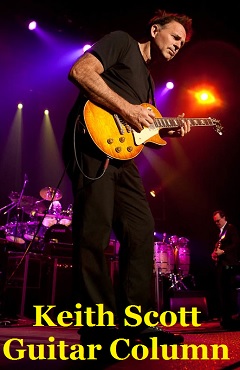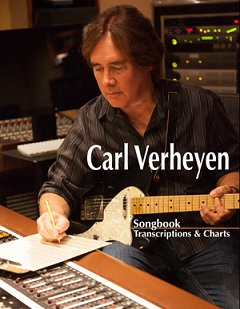Michael Landau
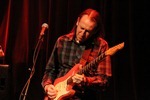
Photograph : Miles Overn
11 years from his last album, and his first all instrumental album since his first album “Tales From The Bulge” released in 1990, Michael Landau now releases his newest studio effort “Organic Instrumentals”. The new album can be described as high quality hard fusion, and Michael Landau explains to us about his approach to playing guitar on this new album filled with superb music and quality sound production.
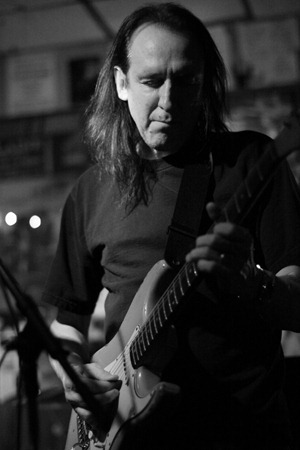
Photograph : Alex Kluft
Interview / Text Mamoru Moriyama
Translation Louis Sesto (EAGLETAIL MUSIC)
Michael Landau from Los Angeles, California has been known as a successful studio guitarist, playing on albums for big names such as Boz Scaggs, Pink Floyd, Miles Davis, Rod Stewart. Michael Landau has also played for various Japanese artists such as Mari Hamada, Kyosuke Himuro, Yumi Matsutoya, Eikichi Yazawa, just to name a few. Even if you do not know the man’s name, chances are that a lot of people have heard him playing the guitar without knowing.
Michael Landau released his first solo album “Tales From The Bulge” in 1990. While working in the studio for other artists, Michael has continued to record his own music releasing 13 albums. Michael Landau also has a group called RENEGADE CREATION featuring Robben Ford on guitar, Jimmy Haslip on bass and Gary Novak on drums. RENEGADE CREATION has released an album and has also had a successful tour to Japan.
Michael Landau now releases his newest studio effort “Organic Instrumentals” featuring a high quality hard fusion type of music. Praised as the ‘best guitar player in the world’ by none other than Steve Lukather, Michael talks about his new album, as well as about playing the guitar.
Muse On Muse : Your latest release is an instrumental album, and the second instrumental releasesince your 1st solo album “Tales From The Bulge”. How and why did you come torecording an all-instrumental album for thisrelease?
Michael Landau:It just felt like the right time and the right stylefor a new record. I sing on about half thesongs when I play live with my band, and Ialso sing half of the songs in RenegadeCreation with Robben Ford. It felt like a goodtime to take a break from singing, plus I’vealways loved instrumental music.
MM : What is the meaning behind the album title”Organic Instrumentals”? Did you have anyparticular concepts in mind in the making ofthe album?
ML : Most of the sounds and guitar tones on therecord are unprocessed organic type guitarsounds. The title to me also has a bit of humor to it, a lot of products these days are “organic” this or “organic” that, the title has a nice flow when you say it, and because of the soundson the record, it really has two meanings, partly serious, and partly a bit funny. Also, most of the song titles are of a nature subject, it ties in with the Organic title that way.
MM : It has been about 20 years since youreleased your 1st solo album “Tales From The Bulge”. It seems as though your sound andperformance has become more clear anddirect over these past 20 years, while you stillmaintain your magnificent nuances. What is your perspective on that? Please also tell uswhat you consider ideal in regards to yourguitar sound.
ML : I used to have a more processed guitarsound, I like my tone better these days, itsmore of a real amp sound. I always strive foremotion both in a live situation and in a recording. A lot of my compositions are fairly simple composition wise, but I try to haveevery song create a strong mood and a strongemotion. I try and make every note count andhave meaning.
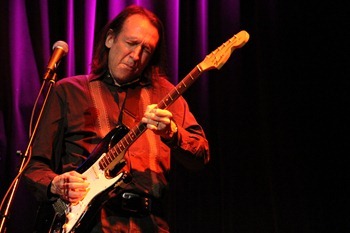
Photograph : Miles Overn
MM : How long did it take you to do thesongwriting for this album? How long did ittake you to record the album?
ML : Some of the songs have been around for afew years. Jaco Pastorius is a favorite of mineand a big inspiration for me musically andattitude wise. I had been working on the piece”Jaco” for several years, playing it around thehouse a lot. I’m glad it found a good home onthe Japanese version of the record, it has aspecial place in my heart much like Japandoes. The minor 7 voicing reminded me of some of Jaco’s voicing’s on the “Word Of Mouth” record. Its a small tribute to his brilliance in my own humble way. I recorded the basic track “Sneaker Wave” with Vinnie about 5 years ago, but the majority of therecord was done in 2011, recording off and on at my studio.
MM : “Delano”, “Smoke”, and “The Family Tree” have a very nice and comforting acousticsound. The actual sound of your fingers sliding on the frets make the sound very real, just as if you were playing right in front of thelistener. This is something that cannot be done by music made by sequencers, computers, sampling, etc. and contains awarmth that only man made live music canconvey. What do you consider most important when you try to convey a live and realisticsound to the listeners?
ML : Music is a sacred thing for me and as I saidbefore it has to have emotion and meaning. So much of the music today is sequenced orprogramed music, that has its purpose but Idon’t believe it should be the norm or it should be jammed in our face like pop culture doesthese days. I love playing live and in thestudio, there’s no need for me to ever programanything except for an occasional guitar ordrum loop, I guess a musical honesty withemotion is the most important thing for me to convey.
MM : Listening to songs such as “Sneaker Wave” and “Spider Time”, we can tell that it is YOU just by listening to the rhythm guitars, with its distinctive feel and wave-like rhythm. All your songs contain rhythm guitar performances and chords that are very versatile, with a variety of musical ideas. How do you create allof these ideas (on a regular basis) and be able to keep in stock all these ideas?
ML : Thank you very much. Rhythm is a huge thing for me, it has to flow and make you feel good, “wave-like” is a great way to describe it. I try to make every note count in the rhythm part as well.
MM : Your solos and lead guitar performances also have a distinctive groove and tone. How did you establish the originality that you currently have as a trademark?
ML : The studio work and side man work has been great for me as a learning process. I’ve learned so much from a lot of the artists and musicians I’ve worked with,
that enabled me to form my own style. The notes you don’t play are just as important as the ones you do play if you know what I mean. I can hear a solo by a musician and I can be loving it and then all of a sudden, they play something that doesn’t fit or is silly sounding and it just ruins the solo for me. I guess I’m good at editing myself on the fly from playing live and in the studio so much, every note has to sound good or I get taken out the moment. Yes, it has to groove!
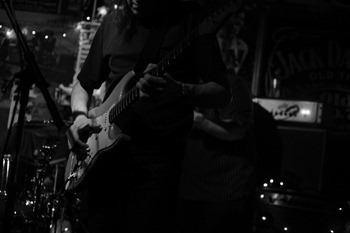
Photograph : Alex Kluft
MM : Your lead guitar performances on the album are very impressive with great dynamics: powerful at times, as well as being very delicate. Do you play more with your fingers (without a guitar pick), than playing with a guitar pick?
ML : Yes I play with my fingers a lot, maybe 50% of the time, it allows me to mute strings that I’m not using, that way you get a strong pure note, the pick and fingers allow an infinite amount of tones combined with an amp and pedals.
MM : How do you decide whether to play with or without a guitar pick for certain phrases?
ML : The switch happens naturally from playing so much, I’ll switch to pick for a brighter sound with more attack, the fingers are a fatter, mellower tone.
MM : Are there any particular artists that have influenced your songwriting? Your lead guitar playing? Your rhythm guitar playing?
ML : For instrumental music, Alan Holdsworth has been a big influence, especially the ballads and the spacier pieces. For the vocal songs, I would say Hendrix, David Hidalgo, and Kirk Cobain. The lead and rhythm players that have influenced me would be a lot to name, most of the ’60 rock bands and all of the great blues guitar players like Albert King and BB King just to name a few. Pat Martino and Jaco Pastorius for the Jazz influence.
MM : There are a lot of younger guitar players that play technically challenging styles, although it seems as though not many have a distinct presence in their tone nor are they very convincing or persuasive with their performance. What do you think is necessary in order to acquire such qualities that you cannot learn from just practicing scales?
ML : Some players are more concerned with the technical aspect of music, you need a certain amount of that to be confident on you instrument, but I’ve always cared
more about the emotion of music, if it doesn’t move you to listen to, then there’s not much value in it in my opinion.
MM : Are there any upcoming guitar players that draw your attention?
ML : I love Kirk Fletcher, Derek Trucks, Dustin Boyer and Josh Smith as far as the younger players.
MM : Tell us about your gear. What guitars, amps, foot pedals did you use for the recording? What kind of guitar picks did you use? What kind of strings did you use?
ML :
Dunlop nylon 1.0 picks
Providence E205 and Belden 9778 cable.
D’Addario 10-46 & 11-49 (depending on the guitar)
Guitars:
’63 Fiesta Red Stratocaster
’68 Sunburst Stratocaster
’52 Telecaster
’63 Gibson SG
’54 Martin 0-15 Acoustic
Amps:
Dumble 100 watt Overdrive Special
Suhr 18 Watt Badger
’64 Fender Super Reverb
Kerry Wright open back 4×12 with Celestion Heritage Series G12-65 speakers
Pedals and Rack Gear:
Maxon SD-9
Vintage 808 Tube Screamer
Rodger Mayer Voodoo-1
Fulltone Plimsoul Overdrive
Boss RT-20 Rotary Pedal
Boss FV-500H Volume
Line 6 Echo Pro
Api Mic Pre
Shure SM 57 mic
Royer R-122 Ribbon mic
MM : Lately there are numerous software and gear that simulate amps. Do you ever try them out? How do you feel about the sound of these simulators?
ML : There’s nothing like playing through a good tube amp for feel and sound. None of the modelers come close to the real thing, I understand the need for them at times, for instance if you need to get a big distorted sound at low volume. I use the Line 6 Pod Pro on sessions sometimes if I’m layering a lot of parts or need a real high gain sound, but 99% of the time its a real amp sound, There’s no modeling sounds on my new record.
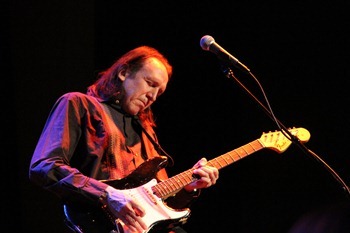
Photograph : Miles Overn
MM : Can you tell us about any memorable episodes from the recording session?
ML : Working on records for Joni Mitchell, BB King, Pink Floyd and James Taylor have been highlights for me, you can learn a lot from being around great artists. When I worked on the Pink Floyd session, David Gilmour walked me through his guitar rig he had set up in the studio, it had a big fat tone, I could tell he really loves working on his sound, it was very fun day…
MM : What are your plans after this? When will you be coming to perform in Japan?
ML : I’m hoping to come to Japan in the fall of this year either with Renegade Creation or my group.
MM : Do you have any plans to release an instructional DVD or live DVD? I’m sure a lot of fans would look forward to this.
ML : I’ve always wanted to do a live DVD, that is also on my list of things to do.
MM : Can we have a few words to your Japanese fans?
ML : Don’t ever let anyone tell you how to play or what style of music you should play, its YOUR music! All of the great artists broke the rules at some point, this is what made them unique and special. Be influenced by the musicians you admire and eventually your own style will emerge!
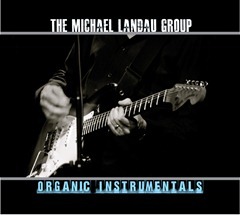
ORGANIC INSTRUMENTALS / THE MICHAEL LANDAU GROUP
KICJ-613 ¥2,600 KING RECORDS
1.Delano
2.Sneaker Wave
3.Spider Time
3.The Big Black Bear
5.Karen Mellow
6.Ghouls And The Goblins
7.Big Sur Howl
8.Woolly Mammoth
9.Smoke
10.The Family Tree
11.Jaco (Japanese Bonus Track)
Michael Landau(Guitar)
Larry Goldings(Hammond organ, Piano)
Estey Reed (Organ, Carillon)
Walt Fowler-(flugelhorn)
Teddy Landau(Bass)
Andy Hess(Bass)
Chris Chaney(Bass)
Vinnie Colaiuta(Drums)
Charley Drayton(Drums)
Gary Novak(Drums)
